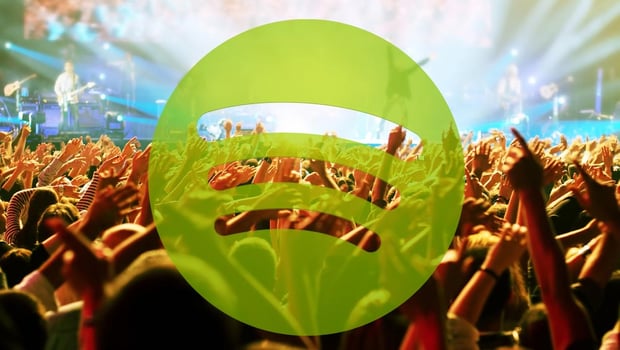 Image via dailyrindblog.com
Image via dailyrindblog.com
This article originally appeared on The Daily Rind.
No doubt we’ve all written and read countless articles about streaming. There will always be those who declare it to be the shotgun-wielding savior of the music industry, singlehandedly delivering us to greener pastures and fatter pockets, and those who declare it to be nothing more than the final fart of a rotting corpse to which we dedicate so much of our professional lives. So I won’t throw my two cents into the mix. I do, however, want to address what could be interpreted as the gentle shift towards providing music consumers with a one-stop shop for all of their consumption needs – in particular, the live music space and ticketing.
Back in 2014, Spotify announced it was giving its users the ability to purchase merchandise through its platform via third party D2C stores, offering fans a one-click solution to adding items to their shopping cart. Even more interesting is Songkick’s integration on Spotify, allowing fans to purchase tickets for live shows and thus opening up huge revenue opportunities from the live music sector. The assumption could be made that a person streaming their favorite artist would find this attractive, perhaps making them more likely to fork out for some new band merch or a gig ticket. You could argue again that premium subscribers would be even more inclined to do so than the average listener. Of course, these are assumptions, but in today’s climate, can a record label or artist really pass on the opportunity to upsell directly to their fans on a platform on which they know their consumer base is actively engaging?
There have been further indications of the industry and its players flirting with this business model – for example, the £8 million YouTube (Google) paid to acquire BandPage and the tidy $450 million Pandora paid to acquire Ticketfly – two giants looking to expand their offerings to keep existing users and attract new subscribers, all the while trying to keep pace with Spotify and Apple. Becoming more than just a streaming or radio platform could be the new approach for the remaining companies who are trying to get ahead in this difficult climate. Gone are the days of boasting how many tracks are available on your platform; if someone can turn live music and ticketing into a consistent revenue stream – perhaps Google Play or Amazon, which have the user base to make a significant impact – we may begin to see such platforms rise above the noise.
If we do find streaming platforms adopting this all-in-one approach, will this have any impact on the amount of data these companies share with artists and labels? It could be mutually advantageous for bands, managers, and labels to have access to greater data, giving them more control around how they target their fanbase and enabling them to understand who they are targeting, and ultimately what product to push once these user pools are identified.
As the landscape continues to shift and big business deals continue to be ironed out between streaming services and ticketing companies, we may very well see more all-in-one approaches and expansion of services. Watch this space.
Next up:
- How to Adapt to the Wide World of Streaming
- 3 Ways to Use Streaming Platforms to Your Advantage as a Developing Artist
- Success With Streaming Services: Is It for Everyone?
- 6 Easy Steps to Streaming Success on Spotify
- The Billboard 200 Chart Will Now Include Streaming. Will It Help Indie Artists?
Kevin Rankin is marketing coordinator at the Orchard.







